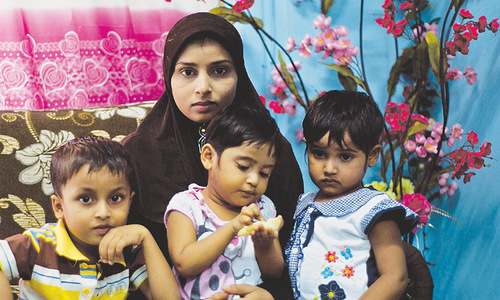In the summer of 1972, Idi Amin, tin-pot dictator and self-styled ‘King of Scotland’, ordered the expulsion of Uganda’s South Asian community, to which my grandmother belonged. He gave them 90 days, citing a dream in which God had ordered him to banish the dukawallas (shopkeepers) from the country.
The history of South Asians in East Africa is one that is seldom told.
Many had arrived at the turn of the century, brought over by the British as labourers and clerks. In postcolonial Uganda, they started their own businesses, setting up homes in elite enclaves far removed from indigenous Ugandans.
Significantly more prosperous, the Asians were suddenly displaced, persecuted by Idi Amin for ‘milking’ the economy.
People cheered. Uganda was for the natives, they would say, heckling and jeering at their compatriots as they boarded buses and planes, embarking on an exodus into uncertainty and statelessness.
Mira Nair’s 1991 film Mississippi Masala depicts the expulsion and relocation of an Indian family from Uganda to the United States during the politically turbulent summer of 1972.
There is a particularly poignant scene at the beginning, when one of the South Asian men fleeing the country is about to board a plane to London — while waiting on the tarmac, he kisses the ground, declaring his unconditional love for a nation that has rejected his people.

My grandmother was born in Tanzania in the 1930s, but soon moved to Uganda where her father had arrived as one of the first British Indian medical doctors in 1928. She and her younger siblings grew up in Kampala, the capital city of Uganda, until she was sent to an all-girls school in a then undivided India.
She returned after her studies, but not for long. At 18, she married my grandfather who had joined the Pakistan Army, moving permanently to the newly partitioned state.
Fresh-faced and radiant on her wedding day despite the Lahore heat, she probably knew that this would be the first of many moves in her new role as an army wife.
But I wonder now if my grandmother knew before leaving Kampala that she would never return.
Did she say a fitting goodbye?
Was she happy to leave?
I imagine that she must have been somewhat devastated, but there’s no way of knowing how she felt as she sailed across the Arabian Sea, from Mombasa to Karachi and then up through the Punjabi heartland, to her new home, her new life.
For the rest of her siblings, it would be another 22 years until they had to leave Uganda behind.
In their case, it wasn’t a voluntary migration, but a forced exodus imposed upon them, and 60,000 other Ugandan Asians by Amin’s brutal regime.
Take a look: They fled Uganda with nothing, but built a new empire
Their journey into exile was marred by urgency. They fled with their keys still in the ignitions of their cars, their front doors unlocked. They took their clothes and their photo albums, some money to start a new life in England, but nothing else.

‘God’ had spoken to Idi Amin, and when God speaks, He has the final word.
Apart from a few right-wing British MPs who made some noise about resettling Ugandan Asians, and nativist sentiments within a few conservative quarters, their transition to English suburbia was relatively smooth.
There was no talk of barbed wire fences or walls, of rigid quotas, or closed borders. Soon enough, they were handed maroon British passports after they lost their Ugandan citizenship — the trauma and tragedy of their exodus fading away into distant memory.
In 1979, Idi Amin himself was deposed and forced to flee, given sanctuary in Jeddah by the Saudi royal family.
In 2003, he died in exile, away from his home and his country just like those he had driven out years before.
By 1972, my grandmother had lived in four different cantonments and Jordan.
From Peshawar to Multan, Quetta to Amman, Rawalpindi to London, my grandmother carried Uganda with her everywhere, like a talisman.
It had been more than 20 years since she had left Uganda behind, but she always carried it with her — a constant thread woven into the tapestry of her ever-changing experience of place and home.
It found its way into the food she cooked, the broken Swahili she remembered, and the vibrant stories she told us about growing up in Africa.
There must have been a sense of longing for those carefree years. She must have yearned to return, just once, to the city where her father had lived and died, where he had been laid to rest in 1957 while she built a family of her own in a country that was only 10 years old.

In 1996, as she neared the end of her life, she must have thought about the Sipi Falls and the ferries on Lake Victoria, about Entebbe and the seven hills of Kampala, about freedom, and exile, and homecoming.
Uganda had been the centripetal force in her personal narrative of movement and migration. When the time of her passing came, it became the residue left at the bottom of her memories, as though her life could be measured out in cups of coffee — the fluid part, lived and fully experienced, and the filtrate — unlived, unresolved, yet, somehow desired.
This past January marked 20 years since her death. Next August, it will be 45 years since Idi Amin’s initial expulsion order.
Ramazan is upon us now. At iftar every evening, there is the usual fare: deep-fried samosas filled with mincemeat, fruit salad sprinkled with chaat masala, but also chilli mogo cassava and nyama choma ribs — East African recipes that my grandmother passed down to my mother.
And just like that, 45 years on, Uganda takes its seat at our dinner table every night, sandwiched between the places we have left behind, and the memories we carry forth.













































